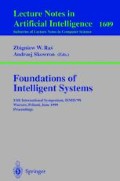Abstract
There is increasing interest in using evolutionary algorithms to solve problems in which the fitness landscape is nonstationary. Not surprisingly our favorite EAS developed for static optimization problems don’t, fare too well in changing worlds. In this paper we, explore the issues involved, identify some key elements, and provide a more structured framework for designing EAs that perform well in dynamic environments.
Preview
Unable to display preview. Download preview PDF.
References
Angeline, P. (1997). Tracking extrema in dynamic environments. In Sixth International Conference on Evolutionary Programming, pp. 335–345. Springer Verlag.
Bäck, T. (1998). On the behavior of evolutionary algorithms in dynamic fitness landscapes. In IEEE International Conference on Evolutionary Computation, pp. 446–451. IEEE Press.
Bäck, T. and H.-P. Schwefel (1993). An overview of evolutionary algorithms for parameter optimization. Evolutionary Computation 1(1), 1–23.
Cobb, H. and J. Grefenstette (1993). Genetic algorithms for tracking changing enviroments. In Fifth International Conference on Genetic Algorithms, pp. 523–530. Morgan Kaufmann.
Dasgupta, D. and D. McGregor (1992). Non-stationary function optimization using the structured genetic algorithm. In: R. Männer and B. Manderick (Eds.), Parallel Problem Solving from Nature, pp. 145–154. Elsevier.
Davis, L. D. (1989). Adapting operator probabilities in genetic algorithms. In Third International Conference on Genetic Algorithms, pp. 61–69. Morgan Kaufmann.
Goldberg, D. and R. Smith (1987). Nonstationary function optimization using genetic dominance and diploidy. In Second International Conference on Genetic Algorithms, pp. 59–68. Morgan Kaufmann.
Author information
Authors and Affiliations
Editor information
Rights and permissions
Copyright information
© 1999 Springer-Verlag Berlin Heidelberg
About this paper
Cite this paper
De Jong, K. (1999). Evolving in a changing world. In: Raś, Z.W., Skowron, A. (eds) Foundations of Intelligent Systems. ISMIS 1999. Lecture Notes in Computer Science, vol 1609. Springer, Berlin, Heidelberg . https://doi.org/10.1007/BFb0095139
Download citation
DOI: https://doi.org/10.1007/BFb0095139
Published:
Publisher Name: Springer, Berlin, Heidelberg
Print ISBN: 978-3-540-65965-5
Online ISBN: 978-3-540-48828-6
eBook Packages: Springer Book Archive

